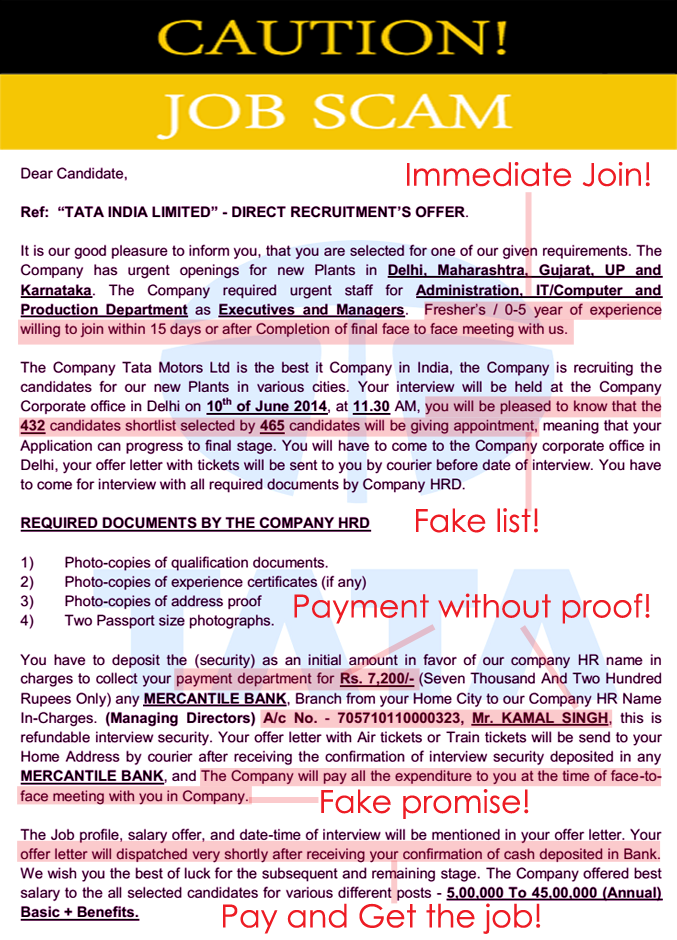Employment Scams
The common employment scams that is on trend:
Finding a job is a daunting task for any graduate. Knowing this very well, scammers take advantage of people who seek genuine jobs by providing them with fake job promises. These employment scammers are brutally creative, and they can easily make you fall into their bogus placement tricks, causing you to lose your money, time, and—in the worst-case scenario—they may even commit criminal activities using your name and address. Make one thing clear: no legitimate employers or employment firms will ask you to pay before getting placed. If they do, then it clearly indicates a red flag, and it is wise to stay away from them.
How scammers approach you:
If you are receiving call letters with logos of reputed companies inviting you to attend an interview on a specified date at a location that is not within your vicinity, never hesitate to call the mentioned location and verify whether the interview is legitimate or not. Most scammers intentionally schedule such interviews in different states to extract money from you for air tickets and accommodation, aiming to benefit as much as possible from your expenses. Sometimes, you might receive emails with an appointment letter stating that you are being recruited directly without any interviews, but you are required to pay a certain amount for paperwork. If you come across any such offer, kindly ignore it, as no legitimate company will recruit candidates without first evaluating their efficiency and capabilities.
How does employment scams work:
They track job seekers' resumes from job portals and contact them, claiming they are looking for freshers or experienced professionals for their client’s company, and that you meet their job criteria and they are interested in hiring you. Once you are convinced by their persuasive speech and wish to accept the job offer, they immediately begin to scrutinize your personal information—such as your bank account number, credit card details, Social Security number, and other sensitive data—enough to entangle you in an employment scam and identity theft.
Without your knowledge, they will start using your personal information to commit felonies, leaving you stranded after you’ve paid for training materials, certifications, and fake appointment letters that never materialize.
Fresh graduates are highly vulnerable to employment scams:

Ways to protect yourself from getting scammed:
Never ever respond to mails from unauthorized web portals that attract you with high packages in the name of reputed companies. Do research and confirm whether the offer is genuine before sharing your personal details with the employer. Ask yourself—is it necessary to attend doubtful interviews that demand high charges? Take the liberty to directly call companies that have scheduled interviews for you, rather than relying on third parties. Come out of the mindset that supports the policy "pay and get the job."
It is quite common for scammers to target individuals who desire to make quick money. So, seek a genuine job that matches your qualifications and skills rather than one that merely offers a high salary.
Example of Employment scam
NOTIFICATION OF EMPLOYMENT
Trade Centre Road ? Dubai
P. O. Box: 82541, Dubai
United Arab Emirates.
Email: wpv.ae@middleeasttraveltours.cu.cc
Alter: middleeasttravelt.uae@yandex.com
Phone: +971 523 3287785
Contact Person: Anthony S. V. Woods
ENG. Ranja Zayed
Employment Processing Manager
Al Habtoor Leighton LLC (HLG) UAE
Airport Road, Rashidiya
P.O. Box 10869
Tel: + 971 526 574052
Fax: + 971 526 570000
Dubai,
United Arab Emirates.





